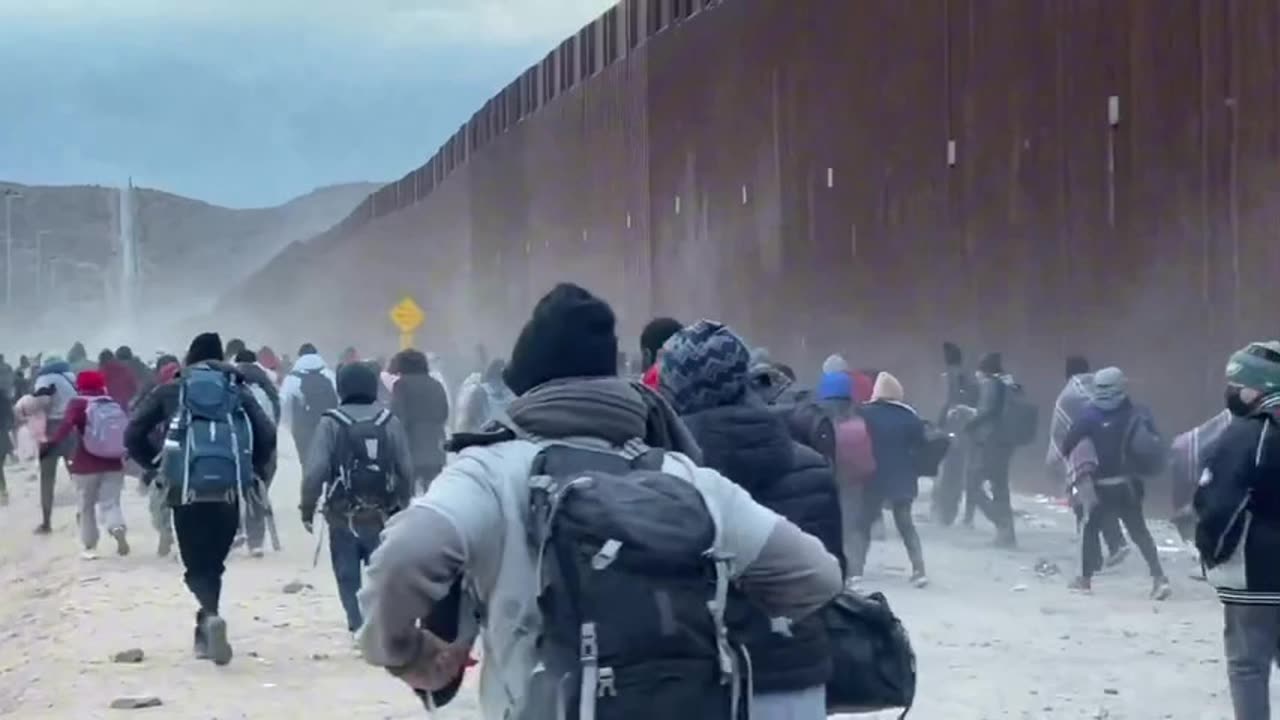Premium Only Content

Unveiling the Crisis: How the U.S. Border Policy Shift Under Biden Affects America
The United States is facing a significant border crisis under President Biden’s administration, bringing into sharp focus the deep ideological divide on immigration policy. From a conservative perspective, this crisis represents a collapse in the enforcement of sovereignty, law, and order. The surge in illegal border crossings is not merely a matter of statistics; it holds profound cultural, economic, and political implications for the fabric of the nation.
A Surge of Unprecedented Numbers
The issue of immigration is not new to American politics, but under Biden’s administration, the situation at the southern border has reached unprecedented levels. In 2023 alone, U.S. Customs and Border Protection recorded over 3.2 million encounters, a number that dwarfs those during the Trump administration, where border apprehensions peaked at 1.4 million in 2019. The stark increase is attributed to changes in immigration policies and signals sent by the Biden administration that, in the conservative view, promote leniency and a more open-door approach.
Cultural and Social Shifts: An Erosion of Local Traditions
While immigration has always played a role in shaping American culture, the rate and nature of this influx are viewed as unsustainable by many conservatives. Communities in border states have been overwhelmed by the sudden surge, leading to strains on public services, schools, and healthcare systems. From this standpoint, the crisis represents more than just numbers; it is about maintaining a balance between cultural preservation and adaptation. While conservatives acknowledge the value immigrants bring to the country, they argue that without proper vetting and assimilation processes, the nation’s cultural identity risks being eroded.
Historically, controlled immigration allowed for more seamless integration, a process that honored both the immigrant’s heritage and the foundational values of the United States. The current unchecked flow disrupts this balance, leaving communities unable to manage the impact.
The Public Safety and Crime Nexus
A crucial point of concern in conservative circles is the correlation between illegal immigration and crime. Data shows that among those crossing the border illegally, a percentage includes individuals with criminal records. Border Patrol agents have consistently raised alarms about drug trafficking, human smuggling, and the infiltration of criminal cartels, such as MS-13. These elements heighten the risk to national security and public safety. Moreover, overwhelmed local law enforcement struggles to keep up, which further erodes public trust in the system.
It is important to note that not every individual crossing the border illegally is engaged in criminal activity. Yet, the conservative position maintains that the lack of vetting and enforcement of immigration laws invites unnecessary risks into communities.
Political Repercussions: A Nation Divided
The political ramifications of the border crisis have widened the gap between liberals and conservatives. Where Democrats may see humanitarian efforts and pathways to citizenship, conservatives view the crisis as a fundamental breakdown of law and national sovereignty. To many on the right, Biden’s policies signal a disregard for the rule of law, favoring idealistic humanitarian approaches over practical enforcement.
The ongoing debate, particularly leading into election cycles, has mobilized conservative voters, who feel that their concerns over national security and economic stability are not being adequately addressed. This divide is further entrenched by the perception that the current administration is prioritizing the rights of non-citizens over the well-being of its own citizens.
Economic Impact: The Strain on Resources
Economically, the strain caused by illegal immigration is undeniable. The increased demand for public services—ranging from healthcare to education—has put pressure on already stretched budgets. This is particularly true in border states such as Texas and Arizona.
Conservatives argue that while immigrants have historically contributed to the U.S. labor force, illegal immigration undercuts wages and harms American workers, particularly in industries such as construction and agriculture. Furthermore, the provision of emergency healthcare, housing, and social services to undocumented migrants comes at the expense of taxpayers, an economic burden that conservatives believe could be mitigated through stronger border enforcement.
A Historical Perspective on Immigration Policies
To understand the current crisis, it’s critical to look at the history of U.S. immigration policies. The Immigration and Nationality Act of 1965 was a significant turning point, ending the national origins quota system and creating a more diverse immigrant population. However, it also opened the door to debates about the balance between lawful entry and illegal immigration.
Conservative concerns about unchecked immigration are rooted in these historical shifts. They argue that the core principles of national security and lawful entry, which governed immigration for much of the nation’s history, have been cast aside in favor of politically expedient narratives.
The Path Forward: A Return to Enforcement?
From a conservative lens, solving the border crisis means returning to strict enforcement of immigration laws and securing the border. This is not to reject immigration entirely, but to ensure it is done in a way that honors the rule of law, supports the nation’s economy, and protects American citizens.
Conclusion: Rebuilding the Foundations
The border crisis under Biden is not just a political issue but a fundamental question about America’s future direction. While liberals and progressives may advocate for more open policies, conservatives argue for the enforcement of laws, the protection of cultural values, and the preservation of national sovereignty. The border, to conservatives, is not just a line in the sand—it is a boundary of values, identity, and the rule of law that, if left unchecked, risks eroding the very foundations of the United States.
This ongoing debate is set to shape the future of the nation, its policies, and its people. The key challenge will be finding a balance between compassion and order, ensuring that America remains both a land of opportunity and a sovereign nation built on law and order.
-
 1:14
1:14
FragmentsOfTruth
2 days agoHidden Cures: Stories of Healing That Challenge the Medical Industry
162 -
 3:56:27
3:56:27
Due Dissidence
15 hours agoNewsom ROASTED For Pod Save Interview, Candace Owens CALLS OUT Elon, Ian Carroll RATIOES Israel Post
60.1K46 -
 2:16:17
2:16:17
TheSaltyCracker
7 hours agoLooters Descend on LA ReeEEeE Stream 01-12-25
126K258 -
 40:32
40:32
Man in America
12 hours agoRockefeller Medicine COLLAPSES as God's Natural Healing Takes Over w/ Angie Tomky
41.2K15 -
 2:03:30
2:03:30
Nerdrotic
9 hours ago $5.51 earnedMysteries of Egypt with The Brothers of the Serpent | Forbidden Frontier #087
46.2K3 -
 2:29:27
2:29:27
vivafrei
17 hours agoEp. 245: Los Angeles ON FIRE! Gavin Newsom FOR JAIL? Trump SENTENCED! Pardons & MORE! VIva & Barnes
193K282 -
 5:32:42
5:32:42
Nobodies Live
8 hours ago $4.27 earnedNobodiesLive - Rumble Music TEST STREAM 2.0
62.5K2 -
 3:40:10
3:40:10
EricJohnPizzaArtist
7 hours agoAwesome Sauce PIZZA ART LIVE Ep. #30: Classic Gaming!
43.6K6 -
 1:18:42
1:18:42
Josh Pate's College Football Show
9 hours ago $0.83 earnedSEC Dominance Over | National Title Thoughts | Miami QB & DC Moves | Wrong About the Playoff?
34.9K4 -
 LIVE
LIVE
Vigilant News Network
13 hours agoIvermectin & Fenbendazole Cancer Secrets Revealed w/ Dr. William Makis | Media Blackout
1,063 watching